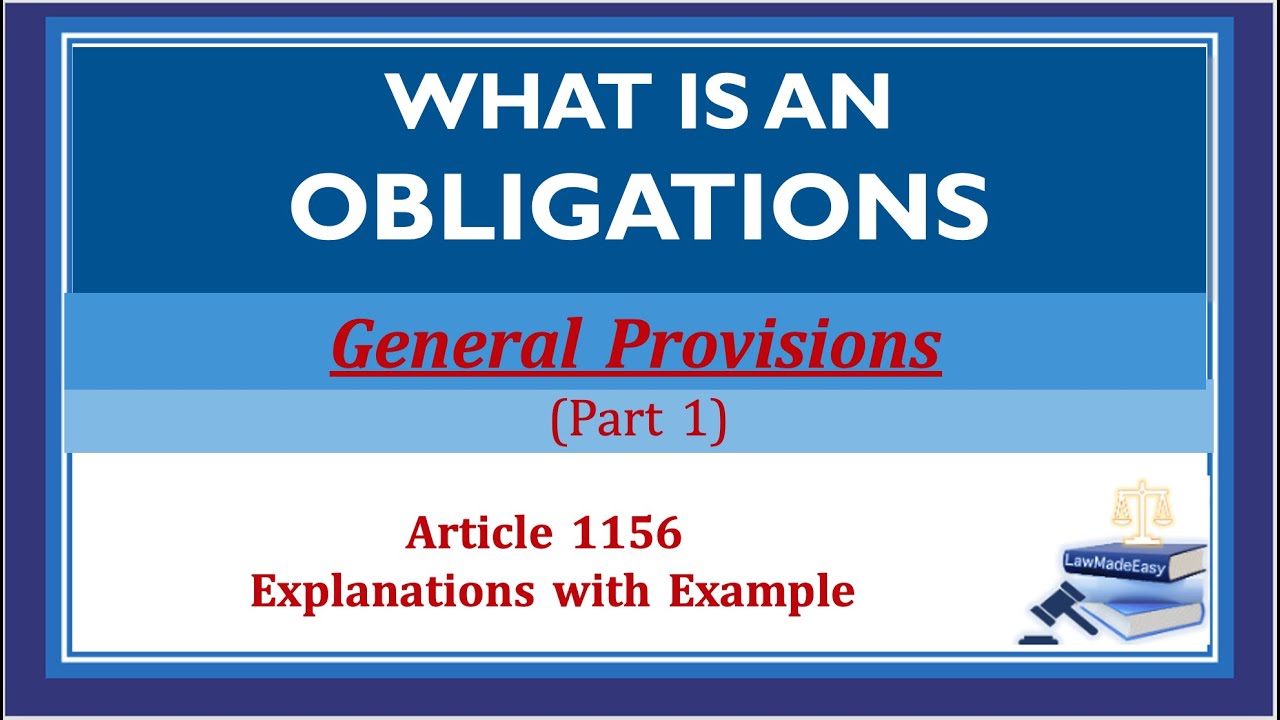Introduction to Extinguishment of Obligations (2020)
Summary
TLDRThis video introduces the concept of extinguishment of obligations as per the Civil Code of the Philippines, focusing on Articles 1231-1304. It covers the six primary modes of extinguishment, including payment, loss of the thing, condonation, confusion, compensation, and novation. Special payment methods such as payment in kind, assignment, and tender of payment are also explored. The video provides viewers with an overview of how different legal obligations can be terminated, with a promise of deeper dives into each topic in future videos. The presentation encourages viewers to subscribe and sign up for a free full course for more detailed learning.
Takeaways
- 😀 Extinguishment of obligations refers to how obligations are terminated or ended under the Civil Code of the Philippines (Articles 1231-1304).
- 😀 Payment or performance is one of the most common modes of extinguishing obligations. Payment can be made with money or goods, while performance involves fulfilling a specific duty or task.
- 😀 Special modes of payment include 'application of payment' (assigning a specific payment to a debt), 'payment in kind' (paying with goods instead of money), 'payment by session' (transferring ownership), and 'tender of payment' (offering legal tender).
- 😀 Loss of the thing is another mode of extinguishment, where the obligation ends if the object of the obligation is lost or destroyed.
- 😀 Condonation or remission of debt occurs when the creditor forgives the debt, thereby extinguishing the obligation.
- 😀 Confusion or merger of rights happens when the creditor and debtor become the same person, eliminating the obligation.
- 😀 Compensation occurs when two parties owe each other equal debts, leading to cancellation of the debts. It can be legal, conventional, or judicial, with different rules for each.
- 😀 Novation is the replacement of an old obligation with a new one, which can involve a change in debtor, creditor, or the object of the obligation.
- 😀 Types of novation include personal novation (changing the debtor or creditor), real novation (changing the prestation or object), and mixed novation (changing both).
- 😀 In personal novation, there can be substitution (replacing a debtor) or delegation (assigning a new debtor), both altering the original obligation in different ways.
Q & A
What is the focus of the video series on extinguishment of obligations?
-The video series focuses on explaining the different modes of extinguishment of obligations under the Civil Code of the Philippines, particularly Articles 1231 to 1304.
What is meant by 'extinguishment of obligations'?
-Extinguishment of obligations refers to the various ways through which a debtor’s duty or responsibility to fulfill an obligation is brought to an end or canceled.
What are the six primary modes of extinguishment discussed in the video?
-The six primary modes discussed are payment or performance, loss of the thing, condonation, confusion, compensation, and novation.
How does 'payment or performance' extinguish an obligation?
-An obligation is extinguished when the debtor fulfills their duty, either by paying money or performing a specific action required by the obligation.
What is the 'application of payment' as a special mode of payment?
-The 'application of payment' occurs when the debtor specifies how their payment should be allocated to the debt, such as paying off specific parts of a larger debt.
How does 'payment in kind' work as a special mode of payment?
-In 'payment in kind,' instead of paying money, the debtor offers goods, services, or non-cash assets (e.g., trading a product or item in place of money).
What is the concept of 'novelty' in relation to novation?
-Novation involves replacing an existing obligation with a new one, thereby extinguishing the old obligation. This can include changing the debtor, the creditor, or the subject matter of the obligation.
What happens in the case of 'condonation' of a debt?
-In 'condonation,' the creditor voluntarily forgives the debt, meaning they waive the obligation and no longer require the debtor to fulfill it.
What does 'confusion' or 'merger of rights' refer to?
-Confusion or merger of rights occurs when the roles of creditor and debtor merge into one person, extinguishing the obligation, such as when a person both owes and is owed the same amount.
Can you explain how 'compensation' extinguishes obligations?
-Compensation occurs when two parties are both creditors and debtors to each other, and they offset their debts, effectively canceling out both obligations. There are different types of compensation, such as legal, conventional, and judicial compensation.
Outlines

This section is available to paid users only. Please upgrade to access this part.
Upgrade NowMindmap

This section is available to paid users only. Please upgrade to access this part.
Upgrade NowKeywords

This section is available to paid users only. Please upgrade to access this part.
Upgrade NowHighlights

This section is available to paid users only. Please upgrade to access this part.
Upgrade NowTranscripts

This section is available to paid users only. Please upgrade to access this part.
Upgrade NowBrowse More Related Video

General Provisions - Obligations (Part 1)

Dwi Aryanti Ramadhani, S.H., M.H. - HUKUM PERIKATAN (JENIS-JENIS PERIKATAN)

UPDATED DISCUSSION: What is an Obligation? Obligations and Contracts General Provision. Part 1.

Pure and Conditional Obligations

Law on Obligations- Chapter 1

Hukum Perdata #19 | Pengertian dan Sumber Hukum Perikatan
5.0 / 5 (0 votes)